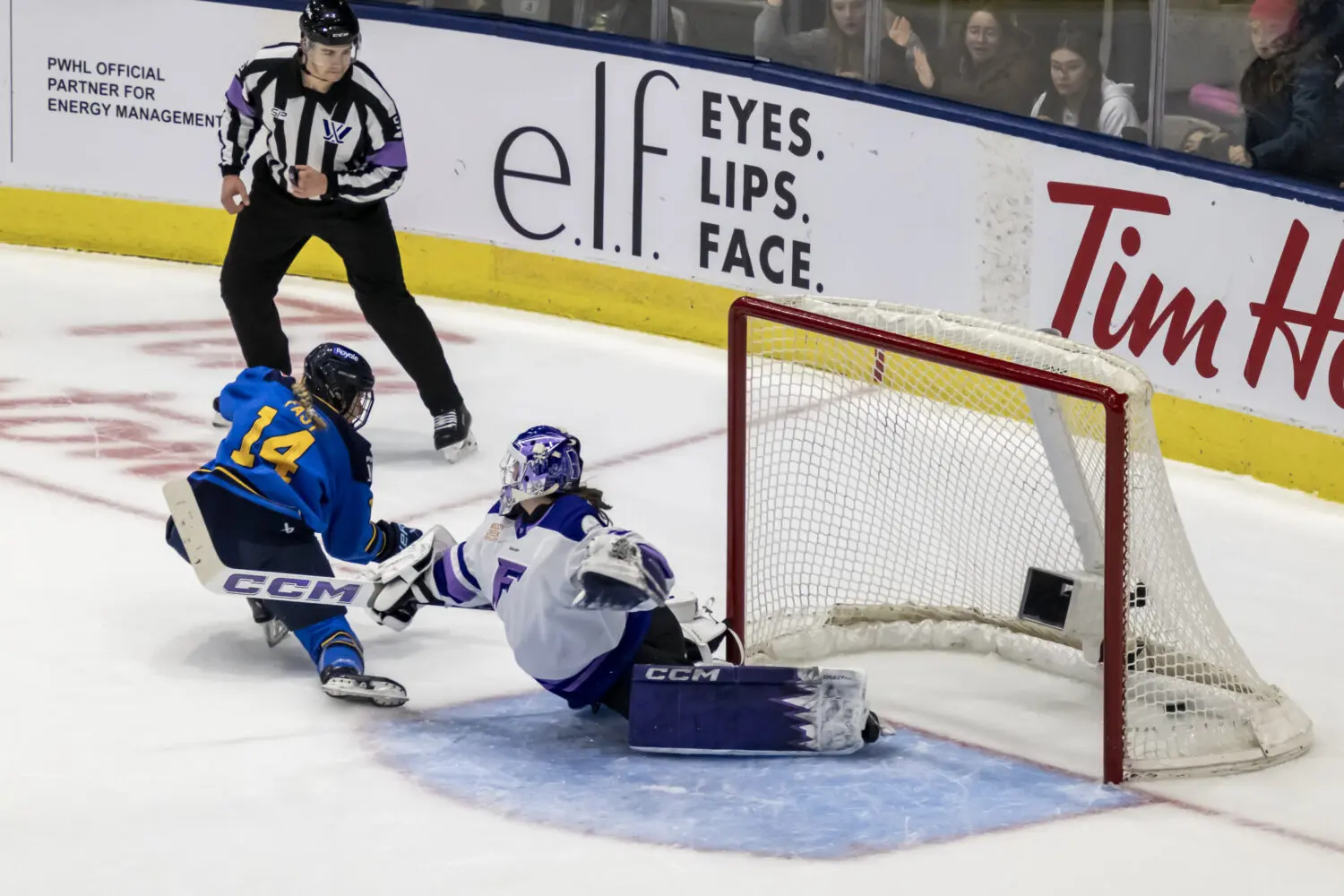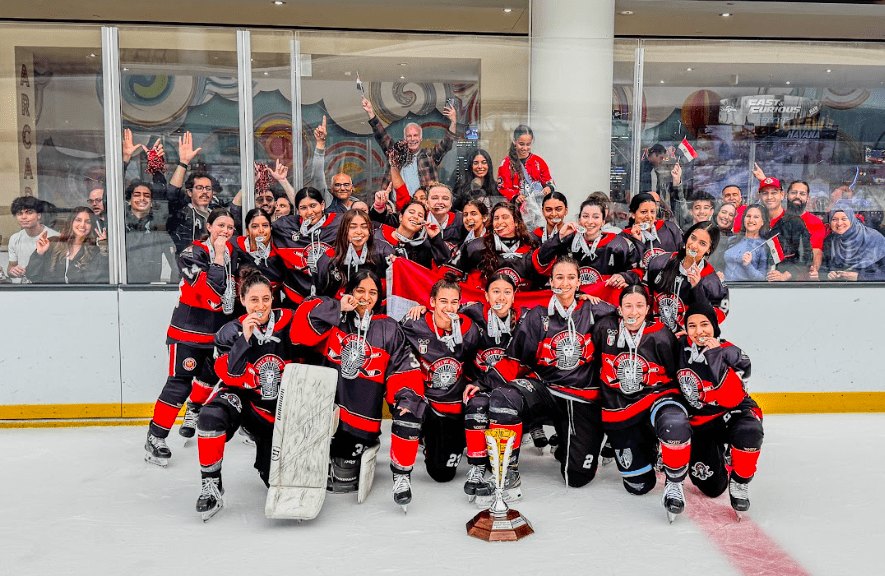 One of the hallmarks in the last decade of women’s sports in Canada has seen significant growth in hockey. Said growth has extended far beyond the increase in the number of registered player or the impact of the world class skaters that actually graced the ice in the Olympic Winter Games, raising awareness of their sport.
One of the hallmarks in the last decade of women’s sports in Canada has seen significant growth in hockey. Said growth has extended far beyond the increase in the number of registered player or the impact of the world class skaters that actually graced the ice in the Olympic Winter Games, raising awareness of their sport.
Perhaps the most remarkable aspect during this time has involved the expanding presence of women as coaches, administrators and members of the media. These unsung heroes are every bit the role model of their competitive colleagues, helping bring the game both structure and substance.
Among the most dedicated and charismatic of these women includes Kristen Lipscombe. Having helped to shape the last decade of women’s ice hockey in Canada through her numerous efforts, she is an influential historian. Such admired journalistic contributions compose a lasting legacy while providing her with a cherished hockey journey.
Bringing great perspective to the game, her body of work includes time spent with Hockey Canada, the Canadian Women’s Hockey League and Metroland Media in Halifax, Nova Scotia.
Having played at the university level with the powerhouse Wilfrid Laurier Golden Hawks, Lipscombe was determined to remain connected with the game following the twilight of her playing career.
Serving as a volunteer for Hockey Canada during the 2002 4 Nations Cup in Kitchener, Ont. was one of the catalysts that motivated Lipscombe to pursue her hockey dream. Such a dream would result in an empowering and historic position, helping to shatter the glass ceiling, while emerging as part of a generation of women enjoying careers in the game after their athletic endeavors came to its climax.
“While I may not have been a strong enough hockey player to actually make it on the ice with Team Canada, I always knew I wanted to some how, some day be a part of the national program, so I worked hard to use the abilities and skills I did have to eventually make it there.
I still can’t believe it actually happened, but I became the first full-time female in Hockey Canada’s communications department, and the first female media relations coordinator to stand on the blue line and sing O Canada along with my teammates — both players and staff members — after winning a world championship!”
Working alongside the likes of former players such as Mandi Duhamel, Meghan Hunter and Lesley Reddon, among others, Lipscombe was part of an exceptional group of role models, adding an exciting dimension to the potential of women in hockey. Together, they brought a level of achievement, professionalism and self-esteem, collaborating in the effort to elevate the positive impact that stems from a culture of fairness and opportunity.
Having travelled extensively with the national team at all three levels — the National Women’s Under-18 Team, National Women’s Under-22/Development Team and senior rosters of Canada’s National Women’s Team, Lipscombe’s career took on greater meaning, as she was part of a golden generation of world-class hockey talent. Although she remains humble in her reflections on the championship odysseys, testament to her team-first approach, there is no question that Lipscombe assiduously took on her role with alacrity.

“In total, I was a part of four world championship-winning teams over the course of five years working at Hockey Canada. I won three world championships with Canada’s National Women’s Under-18 Team (2014, 2013 & 2012) as well as one world championship with Canada’s National Women’s Team (2012), which to be honest, I wouldn’t have imagined happening to me in my wildest dreams.
Yet, those world championship wins did happen, and I was able to contribute to Team Canada in a media relations capacity, and I am so honoured and humbled to have been a part of these rosters, no matter how small the role, and to have in a way made history.
I hope that more girls and women are inspired to work in hockey, as there are so many more ways to get involved off the ice, ranging from coaching to physiotherapy to of course, media relations.
If any females are looking to learn more about or pursue a career in hockey communications or sports media in general, I am happy to touch base with them to chat and offer up any friendly advice that I can.”
 Part of Lipscombe’s amazing body of work also includes an admirable run with the Canadian Women’s Hockey League (CWHL), with which she graciously volunteered her time for several years. Helping to bring structure and direction to the league’s media protocols, it was part of a transition that saw the league evolve from local status to national phenomenon.
Part of Lipscombe’s amazing body of work also includes an admirable run with the Canadian Women’s Hockey League (CWHL), with which she graciously volunteered her time for several years. Helping to bring structure and direction to the league’s media protocols, it was part of a transition that saw the league evolve from local status to national phenomenon.
Undoubtedly, Lipscombe’s legacy in the CWHL also extends beyond her administrative capacities. During her trailblazing time with the league, she took on a mentoring role, opening the door for many aspiring journalists to hone their craft, while allowing the fans a more ethereal connection with their hockey heroines, through an amazing series of player profiles and features.
One of the crowning achievements in Lipscombe’s many seasons with the CWHL took place in Dec. 2014. With the league hosting its first-ever All-Star Game, it was a watershed moment for women’s ice hockey in Canada.
Hosted at Toronto’s Air Canada Centre, the venue provided a major league feeling for all involved with the event. For an individual as experienced as Lipscombe, whose media credentials have taken her throughout North America and Europe, it was an opportunity for her to showcase her media skills, help supply a significant contribution to an amazing event, while serving as an ambassador for the league among the gathering of interested media on-hand.
“Back to your part of the question referring to the Canadian Women’s Hockey League, I was so proud to be asked to volunteer as communications director for several years on behalf of Hockey Canada. I worked hard to set up policies and procedures surrounding media relations and website content for the CWHL, including for events such as the championship Clarkson Cup tournament and annual All-Star Game.
After a couple of years into volunteering on the side, my work for the CWHL became more like a second full-time job, but I loved every second of it, because I felt like I was truly making a difference in the growth of the women’s game, which was and still is extremely important to me both professionally and personally.
Essentially, I wanted to give back to the game what I could, because of what the game has given me throughout my life, from lessons such as overcoming obstacles and staying committed to making your dreams come true, to values and traits such as self-confidence, team work, sportsmanship and perseverance.
I have and always will continue to participate in the game, play the game and give back to the game, because women’s hockey — like writing — is an innate part of who I am.”
While Lipscombe’s journalistic career remains a work in progress, a riveting narrative not yet fully realized, her impact extends far beyond. There are many writers who owe her a debt of gratitude, as she introduced them to a much larger world, consisting of world-class athletes and impressive venues that would have been out of reach in other circumstances.
Throughout all facets of her career, Lipscombe remained faithful to the women’s game, raising awareness about its superstars, volunteers and aficionados. One could assemble all her articles over the years, and it would compose a profound sequence of events depicting her appreciation for all aspects of the game,
 “As for my legacy in journalism or my proudest achievement, I’m not sure if I have accomplished those yet! I consider my time at The Chronicle Herald, Hockey Canada, the CWHL and Metro Halifax to all be important chapters in the story of my ongoing career, but it’s not over yet!
“As for my legacy in journalism or my proudest achievement, I’m not sure if I have accomplished those yet! I consider my time at The Chronicle Herald, Hockey Canada, the CWHL and Metro Halifax to all be important chapters in the story of my ongoing career, but it’s not over yet!
Although I am no longer full-time at Hockey Canada, and taking a break from volunteer work with the CWHL, I have no doubt my involvement will continue long into the future, in varying degrees and capacities.
I still have many goals, dreams and ideas about how I can contribute to the sport I love so much. In many ways, I still can’t believe what I have accomplished thus far, and am humbled to have worked with many of the best female players and minds in the game, but in other ways, I feel like I worked hard for what I have achieved, and am proud to have contributed to women’s hockey using my unique abilities and skills.”
Having stood shoulder-to-shoulder with the greats of the game, Lipscombe was at its pulse. Chronicling the game in a style that also revealed a heartfelt appreciation, it is a feeling that is reciprocated among those that know her. Kind and gracious, she has left a positive impression on so many.
While the transition to the next chapter in Lipscombe’s journalistic and creative endeavors sees potential development in an online capacity, her focus on opportunities for women in sport has never wavered. Contemplating what meaning her body of work may provide, the feeling of encouragement rises to the surface, dedicated towards bringing a new definition to “teamwork.”
“If I could leave any legacy, or create inspiration at this point in time, it would be to encourage more girls and women to get involved in hockey, sports or whatever they love, even if they are male-dominated environments, as well as to have a voice and stay strong no matter how tough the glass ceiling may seem.
One of my biggest challenges was, and still is, breaking through that glass ceiling (yes, it still exists) but I believe that together, we can smash it to pieces. When it comes to women’s hockey, from playing it to writing about it, I am all heart and that will never change.”
“All quotes obtained first hand unless otherwise indicated”
Photo credits: Hockey Canada images
[adrotate group=”1″]
Related Articles
Categories
Recent Posts
[adrotate group=”2″]




